JWW members prioritize collaboration, communication, and engagement at Membership Meeting
“Since early 2020, a lot has changed. We can’t go to a show. We can’t go to a ball game. We can’t go to a concert. We’ve given up shaking hands. But one thing that we have been able to do is turn on our taps and have water and flush out toilets. The water and wastewater sectors in the state have worked very hard to keep all of those vital services going throughout the pandemic and will continue to do so.”
—Peggy Gallos
Executive Director, Association of Environmental Authorities
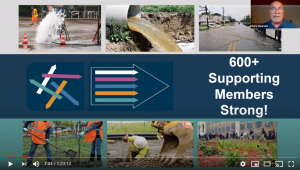
Jersey Water Works’ fifth annual membership meeting took a new form this year. Jersey Water Works co-chair Mark Mauriello welcomed over 140 attendees who joined the virtual meeting to hear state leaders and experts speakers discuss COVID-19 responses and strategies to prepare for the next crisis. And, they heard from Jersey Water Works leaders about how the collaborative is tackling New Jersey’s water infrastructure challenges.
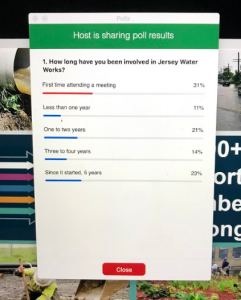 |
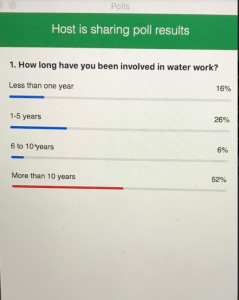 |
As one of the oldest states in the country, New Jersey has long standing water infrastructure issues that will require meaningful investments. Assemblyman Robert Karabinchak, chair of the Assembly Special Committee on Infrastructure and Natural Resources, has been holding hearings to learn from experts about the extent of our state’s water infrastructure challenges and what types of solutions are necessary. The key will be finding a sustainable funding source to implement the solutions in the current fiscal climate.
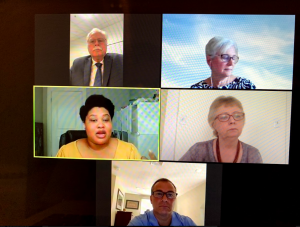
The New Jersey Department of Environmental Protection (NJDEP) has had its share of experience with natural disasters, but had yet to encounter a pandemic. Michele Putnam explained that the department was quick to pivot to respond to the needs of utilities while maintaining high standards for water quality. The department developed guidance documents that would allow utilities to continue to operate and take and test samples while practicing social distancing to keep workers and the public safe.
Most people only think about drinking water and wastewater utilities when something goes wrong, but to Gregory Tramontozzi of Passaic Valley Sewerage Commission, failure is not an option. The utility reduced on-site staff by 60% to facilitate social distancing and created a crisis management team—based on lessons learned from Superstorm Sandy—to keep the operation running smoothly and safely.
On the ground, community engagement required a new approach. How can communities be brought to the table without reliable access to virtual meeting platforms? Nicole Miller of MnM Consulting knows that communities that are empowered to inform and guide solutions, especially those of color and lower-income communities, are critical to developing optimal solutions that the community trusts and can feel good about. Social media outreach and in-person relief efforts can both inform and engage residents.
Attendees also got a sneak peek at Jersey WaterCheck, an innovative data dashboard that will track drinking water and wastewater systems to inform the public and make the case for critical infrastructure investments. Jersey WaterCheck Program Manager Jyoti Venketraman introduced Wynnie-Fred Victor Hinds and Dan Van Abs, members of the JWW data advisory committee, who offered insight on how Jersey WaterCheck will provide consumers with information about every drinking water and wastewater facility in the state and provide communities with a way to engage with their utilities. The availability of this data will get New Jerseyans thinking about the importance of water quality and the protection of water resources. The dashboard will also allow utilities to learn from one another, which can accelerate infrastructure improvements.
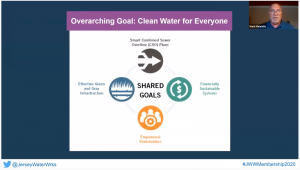 |
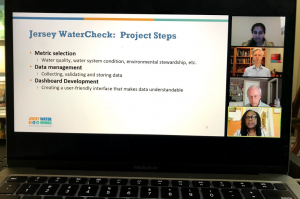 |
The Membership Meeting featured spotlights on five JWW committees in which the committee co-chairs provided updates on the committees’ work:
- The Asset Management and Finance Committee is working on a new project in conjunction with the CSO committee that looks at the intersection of water and sewer affordability and the CSO plans to ensure that necessary infrastructure investments do not burden those least able to afford them. The committee’s work took on a new urgency during the COVID pandemic as more people struggle to pay their utility bills and utilities must continue to operate with decreased revenue.
- The Education and Outreach Committee continues to find new and innovative ways to educate communities on the importance of water infrastructure investments and to promote JWW members’ accomplishments.
- The Green Infrastructure (GI) Committee is analyzing GI incentive structures across the country to develop a framework for including GI as an eligible project under New Jersey’s stormwater utility legislation. The committee has been working with the Rutgers Water Resources Program to offer trainings, which have seen attendance grow exponentially since transitioning to an online format during COVID.
- The Combined Sewer Overflow Committee is working to ensure that the Combined Sewer Overflow Long Term Control Plans, due in October, are reviewed and implemented in ways that promote equity. COVID has made employment more important than ever, so the committee is working to develop a pipeline to connect residents to water workforce jobs in their communities.
- The Lead in Drinking Water Task Force is refining policy solutions related to two pieces of proposed legislation: one that would require lead service line inventories and replacements, and one that would mandate disclosure of lead in paint and water in homes. New Jersey is facing a significant budget deficit as a result of COVID, which is likely to impact funding allocated for lead remediation. The task force is developing recommendations so that this important work can continue without exacerbating the strain on the state’s budget.
This work is not possible without the continued dedication and support of Jersey Water Works members. Even during times of uncertainty, members take the time to ensure that they’re collaborating and communicating to find innovative solutions to New Jersey’s biggest water challenges.